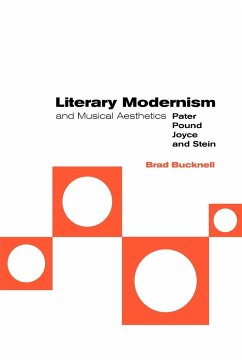This book examines the theory and the practice of music, in relation to the writing of four major modernist figures: Walter Pater, Ezra Pound, James Joyce, and Gertrude Stein. Brad Bucknell argues that in the nineteenth century, music was often invoked as the paradigm of transcendent art. For the modernists, however, late nineteenth-century debates about music's powerful, but non-referential ability to make meaning became a significant focus for their written work. Bucknell examines modernist writers' relationship and engagement with music - from theories about music and musical-literary relations to the composition of music and libretti - to show how music actually became another complex trope deployed in modernism's justification of its own aesthetic practice. Bucknell's study investigates how music, as a discrete artistic mode of expression, and a recurring theme in the work of these four writers, reveals the intricate and varied nature of the modernist project.
Bitte wählen Sie Ihr Anliegen aus.
Rechnungen
Retourenschein anfordern
Bestellstatus
Storno


